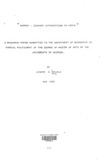| dc.contributor.author | Jama, M.A | |
| dc.contributor.author | Onjala, J O | |
| dc.date.accessioned | 2013-06-28T14:07:29Z | |
| dc.date.available | 2013-06-28T14:07:29Z | |
| dc.date.issued | 1994 | |
| dc.identifier.citation | ABDI, PROFJAMAMOHAMUD. 1994. Jama, M.A., Onjala, J O. (1994) Energy-Economy Interactions in Kenya (submitted to Energy Policy Journal).. Energy Policy Journal. : ELOQUENT BOOKS NY, Strategic Book Group, Connecticut, USA. ISBN-978-1-60911-081-9.Pages1 | en |
| dc.identifier.uri | http://erepository.uonbi.ac.ke:8080/xmlui/handle/123456789/41894 | |
| dc.description.abstract | Commercial energy consumption constitutes only 12-18 % of the total energy requirement in Kenya. The rest of the energy consumed is derived from biomass sources. However, it is the commercial energy supply which has been most volatile in influencing economic growth. Kenya’s commercial energy consumption is dominated by petroleum fuels whose prices tend to be volatile all over the world. The government has always found a justification to subject energy products to high taxes pertinent to upward movements in price of crude oil. Attempts have been made in this study to capture the effect of this behaviour.
While there are no studies which have been conducted to establish a link between energy consumption and the macroeconomy, various studies indicate that the current pricing arrangement in Kenya, apart from not being based on impact analysis, are inefficient and distortionary. In light of this, the objectives of this study have been manifold with the basic objective focussing on computing a macro-model of the energy-economy linkage in Kenya. Based upon the estimated macro-model, simulation runs have been conducted to study the impact generated by 10-20 % increases in energy price on energy consumption, economic growth and inflation. The results reveal a relatively weak long-run energy-economy linkage, i.e energy price increases do not generate sufficient shock in the model to cause recession in the economy. However, these price changes generate noticeable impact on energy consumption, inflation and export earnings. Other interesti ng findings reveal that there are larger responses derived from increased income on energy consumption than the reverse.
Given the low price elasticity of energy demand computed for Kenya, the government appears to have a free hand in pursuing its fiscal measures through higher energy taxes. However, such measures slow the growth of demand for commercial energy and can be seen as premature because they only act to increase demand for other sources of energy and are depressionary. The long-term losses might outweigh shortterm
gains of doing so. Moreover, constrained commercial energy consumption wi11 also serve to aggravate the already existing problems of deforestation and environmental problems associated with overutilization of biomass energies. This calls for price reform efforts in Kenya to be accompanied by "compensating" efforts to encourage consumption of energy resources with positive long-term consequences. | |
| dc.description.abstract | Commercial energy consumption constitutes only 12-18 % of the total energy requirement in Kenya. The rest of the energy consumed is derived from biomass sources. However, it is the commercial energy supply which has been most volatile in influencing economic growth. Kenya’s commercial energy consumption is dominated by petroleum fuels whose prices tend to be volatile all over the world. The government has always found a justification to subject energy products to high taxes pertinent to upward movements in price of crude oil. Attempts have been made in this study to capture the effect of this behaviour.
While there are no studies which have been conducted to establish a link between energy consumption and the macroeconomy, various studies indicate that the current pricing arrangement in Kenya, apart from not being based on impact analysis, are inefficient and distortionary. In light of this, the objectives of this study have been manifold with the basic objective focussing on computing a macro-model of the energy-economy linkage in Kenya. Based upon the estimated macro-model, simulation runs have been conducted to study the impact generated by 10-20 % increases in energy price on energy consumption, economic growth and inflation. The results reveal a relatively weak long-run energy-economy linkage, i.e energy price increases do not generate sufficient shock in the model to cause recession in the economy. However, these price changes generate noticeable impact on energy consumption, inflation and export earnings. Other interesti ng findings reveal that there are larger responses derived from increased income on energy consumption than the reverse.
Given the low price elasticity of energy demand computed for Kenya, the government appears to have a free hand in pursuing its fiscal measures through higher energy taxes. However, such measures slow the growth of demand for commercial energy and can be seen as premature because they only act to increase demand for other sources of energy and are depressionary. The long-term losses might outweigh shortterm
gains of doing so. Moreover, constrained commercial energy consumption wi11 also serve to aggravate the already existing problems of deforestation and environmental problems associated with overutilization of biomass energies. This calls for price reform efforts in Kenya to be accompanied by "compensating" efforts to encourage consumption of energy resources with positive long-term consequences. | |
| dc.description.abstract | | |
| dc.language.iso | en | en |
| dc.title | Energy-Economy Interactions In Kenya | en |
| dc.type | Article | en |
| local.publisher | School of Economics, University of Nairobi | en |

